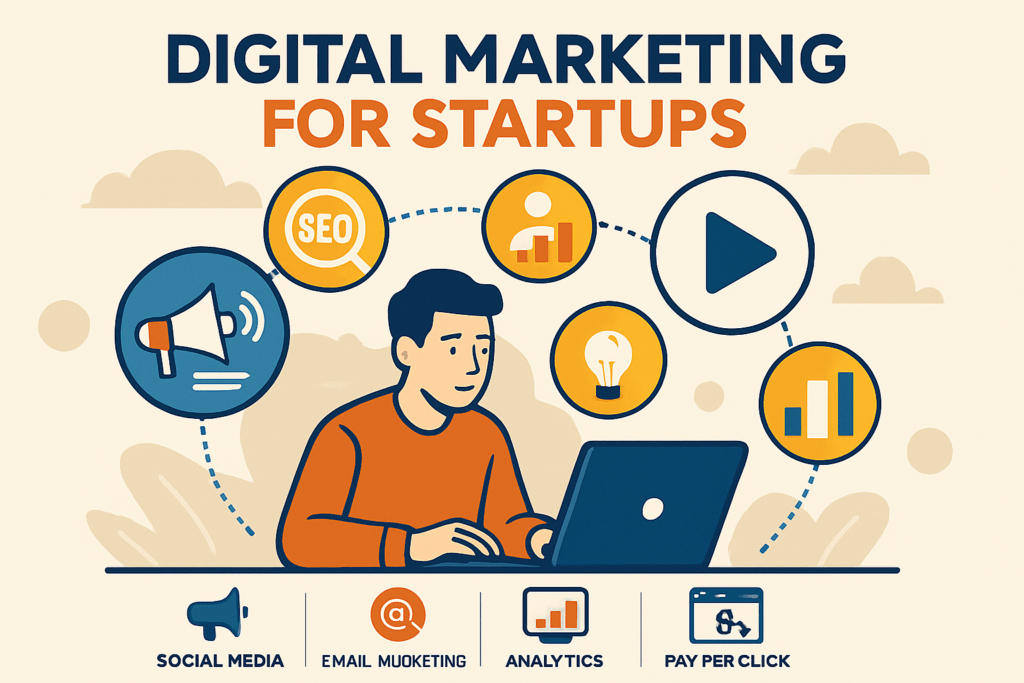Digital Marketing for Startups: Your No-Nonsense Growth Guide
- Start with why every startup needs digital marketing today: crowded markets, limited budgets, and the need to be seen.
- Introduce the core promise: practical steps to expand your business’s reach through smart digital tactics.
- Use primary keyword: digital marketing for startups.
Digital Marketing for Startups: Your No-Nonsense Growth Guide
Let’s cut to the chase: if you’re building a startup, digital marketing isn’t just helpful—it’s survival. Markets are more crowded than ever. Your competitors are hustling, your customers are scrolling, and your marketing budget likely couldn’t buy a round of coffee for a Fortune 500 team. Here’s the deal: If your business isn’t easy to find online, you’re invisible.
Digital marketing for startups isn’t about chasing every shiny trend. It’s about being seen by the right people, without wasting precious resources. Picture it as your direct line between what you’re building and who needs it. The good news? With smart digital moves, you can punch above your weight—find your tribe, grow your presence, and drive real results.
This guide focuses on what works: straight-talking steps and digital tactics to actually expand your reach. We won’t waste your time with fluff, jargon, or ten-step plans you’ll never finish. Let’s get into the nitty-gritty.
Laying the Groundwork: Digital Marketing Essentials
Let’s start at zero. Digital marketing, sometimes called internet marketing, is just about using the web to get your business in front of the right people. For startups, this is your lifeline to reaching customers without burning through cash—or time—you don’t have.
Here’s what matters: you need a home base online (a website), a way to talk to people where they already hang out (think social media), tools to get found (SEO), and the means to reach them directly (email). Don’t overcomplicate things. Your website needs to work on mobile, load fast, and clearly say what you offer. Social channels are where customers scope you out; pick the ones that fit your brand and audience. SEO is about making Google your friend, so people find you when they search. Email? Still the best bet for building relationships—just don’t spam.
Quick word on strategy vs. tactics. Strategy is your big-picture roadmap—the “why” and “where.” Are you building brand awareness? Chasing signups? Tactics are the boots-on-the-ground moves—the “how.” Posting on LinkedIn every week is a tactic. Deciding LinkedIn matters more than Instagram? That’s strategy.
Bottom line: digital marketing for startups isn’t rocket science, but skipping the basics is how you lose digital reach before you even begin. Plant solid roots and you’ll grow faster than the folks fumbling for shortcuts.
Focus Tactics: Where Startups Should Spend Their Energy
You’re short on time, tight on cash, and every move matters. Forget chasing every shiny internet marketing trend. Here’s what actually moves the needle when it comes to digital marketing for startups:
Social Isn’t Optional
Pick one or two social platforms and go all in. Don’t scatter your attention—focus. Instagram and LinkedIn? Fine. TikTok and Twitter? If your audience lives there, absolutely. Nobody cares if you’re everywhere, but people do notice when you show up with real, human posts. Early on, “authentic” doesn’t mean hiring a pro team—it’s pulling out your phone and recording what’s real about your day, your build, your wins (and fails). Scrappy, consistent stuff almost always trumps overproduced, fake content.
Content is Currency
If no one knows what you do, no one will buy. Blogs, videos, and simple case studies are your friend when it comes to online business promotion. You don’t need to write think pieces for the ages—basic how-tos, founder stories, or even customer wins work. Got a video? Transcribe it for a blog. Wrote an FAQ? Turn it into a LinkedIn post. Repurpose relentlessly. Lean teams that squeeze more from every bit of content win this game.
Paid to Play
Ads get your brand seen faster, but early ad budgets should be pocket change, not payroll. Start tiny—$50 to $200 to figure out what works. Test Google Search for high-intent traffic, or Meta/LinkedIn if you’re B2B or targeting very specific audiences. Don’t expect instant sales; use this to validate which messages click. If you’re burning cash without clear wins after a month, pull the plug and regroup.
Get focused, get real, and remember: in a noisy digital world, showing up with clear value and smart experiments beats big budgets every time.
Social Isn’t Optional
Here’s the hard truth: if you’re a startup, social media isn’t a nice-to-have; it’s a must. Social channels are where early-stage brands get noticed without a giant marketing budget. But don’t let FOMO push you everywhere at once. Pick one or two platforms where your customers actually hang out. If your audience is all-in on Instagram and LinkedIn, ignore the rest for now.
Don’t overthink production. You don’t need viral dances or expensive gear—authentic, even scrappy, updates work. Post product moments, founder stories, or behind-the-scenes shots. Your imperfections? They’re relatable. Connect in the comments. Be present, not polished. The goal: build trust and get real feedback fast. Remember, digital marketing for startups is less about broadcasting, more about building a tribe. Choose your channels, show up consistently, and let people know you’re alive and kicking.
What Happens After Winning Millions?
Winning a life-changing lottery jackpot is every player’s dream, but few are prepared for what comes next. While the sudden influx of wealth can bring excitement, it also introduces a wave of challenges. Here’s a breakdown of what often happens to winners:
Financial Realities
Winning a large sum of money means dealing with critical financial decisions:
- Taxes and Legal Obligations: A significant portion of the winnings typically goes to taxes, and failure to manage this can result in legal issues.
- Investments vs. Spending: Some winners hire financial advisors to ensure their long-term security, while others may fall into reckless spending.
- Long-Term Planning: Without proper budgeting, the dream of endless riches can quickly turn into a financial nightmare.
Lifestyle Changes
A sudden fortune alters life in various ways:
- Luxury and Indulgence: Mansions, sports cars, and extravagant vacations become instantly affordable.
- Social Dynamics: Long-lost friends and distant relatives often reappear, expecting a share of the winnings.
- Privacy and Media Attention: Some recipients struggle with unwanted public scrutiny and choose to lead a more discreet life.
Philanthropy and Legacy
For many, newfound wealth is an opportunity to give back:
- Charitable Contributions: Donations to charities and community projects become a priority.
- Investing in Education: Funding scholarships or supporting educational initiatives is a common move.
- Business Investments: Investing in enterprises can create jobs and stimulate local economies.
Whether creating a lasting impact or facing unexpected downfalls, how winners manage their newfound wealth defines their future and the legacy they leave behind.
What Happens After Winning Millions?
Winning a life-changing lottery jackpot is every player’s dream, but few are prepared for what comes next. The sudden influx of wealth can bring excitement as well as a wave of challenges. Here’s what typically unfolds:
The Financial Reality of Winning
Winners often encounter several financial hurdles:
- Taxes and Legal Issues: A sizeable portion of the winnings may be claimed by taxes, and inadequate planning can lead to legal complications.
- Investing vs. Spending: While some winners hire financial advisors for security, others engage in impulsive spending, risking financial stability.
- Budgeting for the Future: Without effective money management, even substantial jackpots can quickly diminish.
Lifestyle Overhaul
Winning the lottery can dramatically alter one’s lifestyle:
- Luxury Purchases: Extravagances such as mansions, sports cars, and lavish vacations become accessible.
- Social Pressure: People often encounter unexpected claims from distant relatives and old acquaintances hoping for financial assistance.
- Privacy Challenges: The newfound wealth often attracts unwanted media attention and public scrutiny.
Though some winners enjoy their wealth openly, others prefer a low-profile lifestyle to minimize stress and expectations.
Giving Back and Creating a Legacy
Some winners view their wealth as a means to contribute positively to society:
- Charitable Donations: Contributions to charities and support for community projects become a priority.
- Educational Support: Funding scholarships and educational programs can provide long-term benefits.
- Investment in Community: Investing in businesses or initiatives that generate jobs and opportunities positively impacts communities.
By transitioning from players to philanthropists, some winners demonstrate that wealth can forge a significant legacy. However, improper management can lead to financial downfalls, emphasizing the importance of prudent financial decisions.
Metrics that Matter: Measuring Your Digital Reach
It’s easy to get lost in the flood of stats that every digital tool spits out. Don’t. For most startups, only a handful of numbers really move the needle: traffic (how many people visit your site), engagement (what they do when they get there—are they liking, sharing, commenting, or just bouncing?), conversions (did they sign up, buy, or take the action you wanted?), and, most importantly, ROI (is any of this making you money, or at least moving you closer to it?).
Getting these numbers doesn’t require fancy dashboards or a background in analytics. Start with Google Analytics (it’s free and more than enough to start), and use the default reporting tools in whatever social or ad platform you’re on. Check them regularly—weekly is good enough at first.
Here’s the bottom line: guesswork is a gamble. Tracking is smart. Look at your numbers, see what’s actually working, cut what’s not. Repeat. This is how you get traction—by measuring your digital reach and making decisions grounded in data, not hope.
Agility is Your Edge: Stay Lean, Learn Fast
If there’s a single unfair advantage for startups in digital marketing, it’s agility. Big brands are stuck in meetings and approval chains. You? You can change strategy before lunch. Lean into that.
Run quick A/B tests—don’t get fancy. Test your email subject lines, call-to-action buttons, or even basic ad copy. Let real results—not gut feelings—steer your next move. If something flops, dump it fast. When you see a little traction, double down.
Obsessing over perfect plans leads to paralysis. Instead, experiment, learn from wild guesses, and iterate. Your growth won’t come from big, risky bets. It’ll come from small, smart adjustments made week after week. The startups that win are the ones that learn the fastest—and aren’t afraid to pivot, often.
Learning from the Best
You don’t have to reinvent the wheel. The best startup marketers steal shamelessly—from proven guides, live case studies, and tested playbooks. Your job? Stay sharp, keep learning, and filter out the fluff.
The digital landscape shifts fast. Major players like HubSpot constantly update their digital marketing guides, packed with not just theory, but tools and walkthroughs you can plug in today. Bookmark and revisit these resources—they’re a goldmine for new tactics, smart frameworks, and jaw-dropping case studies that reveal what’s working right now.
Bottom line: the founders who win are the ones who stay hungry for learning. Use what’s already out there. Adapt, experiment, and always keep your finger on the pulse. Digital marketing for startups is a moving target—so keep moving, too.
Conclusion: Start Simple, Grow Smart
Here’s the sharp truth: digital marketing for startups isn’t about doing everything, but about doing the right things—consistently. Pick a few proven tactics, get comfortable measuring what matters, and don’t spin your wheels chasing shiny objects. The best early-stage teams double down on habits that actually drive digital reach, not vanity metrics. You don’t have to master every platform or trend. You need to understand your audience, show up where they hang out, and keep learning. Small, focused action outshines grand, unfocused plans every time. Get started, stay nimble, and you’ll stack real wins over time.




